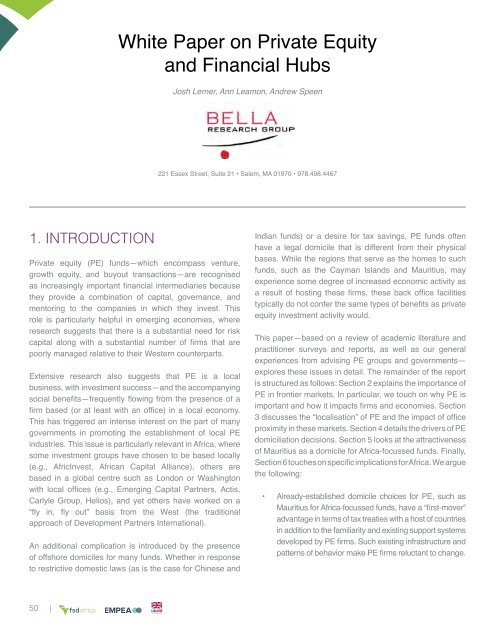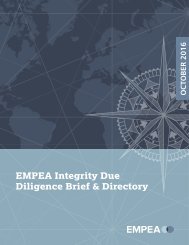You also want an ePaper? Increase the reach of your titles
YUMPU automatically turns print PDFs into web optimized ePapers that Google loves.
White Paper on Private Equity<br />
and Financial Hubs<br />
Josh Lerner, Ann Leamon, Andrew Speen<br />
221 Essex Street, Suite 21 • Salem, MA 01970 • 978.498.4467<br />
1. INTRODUCTION<br />
Private equity (PE) funds—which encompass venture,<br />
growth equity, and buyout transactions—are recognised<br />
as increasingly important financial intermediaries because<br />
they provide a combination <strong>of</strong> capital, governance, and<br />
mentoring to the companies in which they invest. This<br />
role is particularly helpful in emerging economies, where<br />
research suggests that there is a substantial need for risk<br />
capital along with a substantial number <strong>of</strong> firms that are<br />
poorly managed relative to their Western counterparts.<br />
Extensive research also suggests that PE is a local<br />
business, with investment success—and the accompanying<br />
social benefits—frequently flowing from the presence <strong>of</strong> a<br />
firm based (or at least with an <strong>of</strong>fice) in a local economy.<br />
This has triggered an intense interest on the part <strong>of</strong> many<br />
governments in promoting the establishment <strong>of</strong> local PE<br />
industries. This issue is particularly relevant in Africa, where<br />
some investment groups have chosen to be based locally<br />
(e.g., AfricInvest, African <strong>Capital</strong> Alliance), others are<br />
based in a global centre such as London or Washington<br />
with local <strong>of</strong>fices (e.g., Emerging <strong>Capital</strong> Partners, Actis,<br />
Carlyle Group, Helios), and yet others have worked on a<br />
“fly in, fly out” basis from the West (the traditional<br />
approach <strong>of</strong> Development Partners International).<br />
An additional complication is introduced by the presence<br />
<strong>of</strong> <strong>of</strong>fshore domiciles for many funds. Whether in response<br />
to restrictive domestic laws (as is the case for Chinese and<br />
Indian funds) or a desire for tax savings, PE funds <strong>of</strong>ten<br />
have a legal domicile that is different from their physical<br />
bases. While the regions that serve as the homes to such<br />
funds, such as the Cayman Islands and Mauritius, may<br />
experience some degree <strong>of</strong> increased economic activity as<br />
a result <strong>of</strong> hosting these firms, these back <strong>of</strong>fice facilities<br />
typically do not confer the same types <strong>of</strong> benefits as private<br />
equity investment activity would.<br />
This paper—based on a review <strong>of</strong> academic literature and<br />
practitioner surveys and reports, as well as our general<br />
experiences from advising PE groups and governments—<br />
explores these issues in detail. The remainder <strong>of</strong> the report<br />
is structured as follows: Section 2 explains the importance <strong>of</strong><br />
PE in frontier markets. In particular, we touch on why PE is<br />
important and how it impacts firms and economies. Section<br />
3 discusses the “localisation” <strong>of</strong> PE and the impact <strong>of</strong> <strong>of</strong>fice<br />
proximity in these markets. Section 4 details the drivers <strong>of</strong> PE<br />
domiciliation decisions. Section 5 looks at the attractiveness<br />
<strong>of</strong> Mauritius as a domicile for Africa-focussed funds. Finally,<br />
Section 6 touches on specific implications for Africa. We argue<br />
the following:<br />
• Already-established domicile choices for PE, such as<br />
Mauritius for Africa-focussed funds, have a “first-mover”<br />
advantage in terms <strong>of</strong> tax treaties with a host <strong>of</strong> countries<br />
in addition to the familiarity and existing support systems<br />
developed by PE firms. Such existing infrastructure and<br />
patterns <strong>of</strong> behavior make PE firms reluctant to change.<br />
50 |





